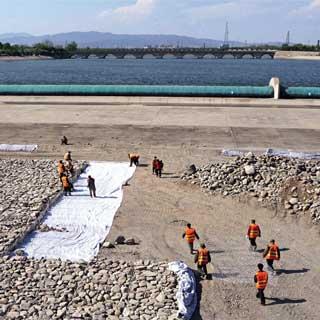
介绍:
In the capital of Beijing, the resurfacing of a city-wide plan to build a gargantuan 230-kilometer waterway network has many experts discussing the best route to take.
Back in 1998, officials in Beijing had put forward a plan to build waterway rings circling the city to address scarcity issues, according to the Beijing Evening News. In 2002, the Beijing Water Authority announced 10 billion yuan would be spent on water system improvements, which included a proposal to construct waterways.
Most recently, a proposal rolled out in April gave a six-to-eight year building schedule for the waterways. Jia Shaofeng, a natural resources researcher at the Chinese Academy of Sciences said the network could reduce water pollution and improve the city’s flood control capacity. Other experts say a key challenge in building the waterways will be identifying a potential water source. The financial implications of the plan – expected to be in the tens of billions of yuan – has also elicited less than sanguine projections on feasibility. Urban planning expert Wang Ke said that given the waterways will not have access to groundwater systems, the city’s overall water quality may not see any improvement.
For Caixin Online, this is Diana Bates.
4月9日,北京市政府发布《关于加快推进河湖水系连通及水资源循环利用工作的意见》(下称《意见》)。《意见》提出,在未来六年至八年,北京市将完成七大水利工程建设,其中第五条即是“三环水系水环境改善工程”。
何为三环水系?《意见》详细列出了三个环状水带(见“北京三环水系示意图”)。“水一环”“水二环”,对北京公众来说比较好理解,前者20公里,基本是围绕后海、中海、南海等建立的原有循环;后者60公里,连通老北京城护城河和通惠河等现有河道。第三环最为壮观,长达230公里,比全长187.6公里的北京六环路还要长。
对于环状河道,中国人并不陌生。古时中国的多数城池,绕城墙一周都有人工挖掘的壕沟作为护城河。但“水三环”的建设规模,前所未有,尤其是长达230公里的第三环。
在财新记者的采访中,多数水利专家赞同北京进行河湖水系连通的举措,但有专家对实现环状水道、改变水流自然流向、大量引入再生水等表示担忧,因为这意味着耗资巨大、大量用水、存在污染地下水风险等。
中科院地理科学与资源研究所研究员贾绍凤深以为然。三环水系本是以北京原有水系为基础的,建设应以修复被填埋河道、恢复干涸河道水面为主,不需要也不应该开辟过多新的地表水域。地表水域表面积越小,水量蒸发就越少,同时需要补充的水量也越少。
贾绍凤认为,如果真的是依现有河流而建,不过分追求水量和循环流动,那可以推断三环水系的造价不会太高。
北京市城市规划设计研究院的专家王科、环迪、崔吉浩等曾在一篇共同署名的论文中论述了精明配置地表水资源在北京水系规划中的重要性,认为环境建设不应该一味追求河道的宽度和水量规模。“存在于城市中水量较少的低等级河流,同样具有旺盛的生命力,这些小支流如同网状毛细血管一样,为城市输送着活力。”
王科等城市规划专家在论文中写道:“人工配置与地下水没有联系、违背自然生态特征的地表水资源,在改善生态环境、创建一个正常的水循环系统方面,所起到的作用是大打折扣的。”
大家还在听

